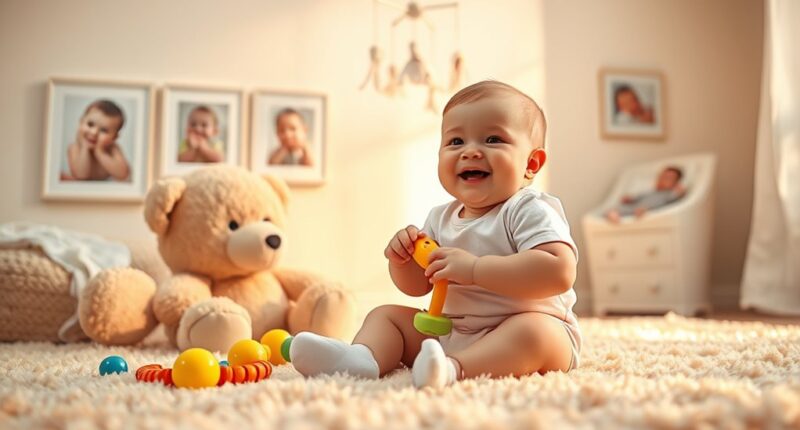In your baby’s first year, you’ll witness incredible milestones in various areas. They’ll start with tummy time, leading to rolling, sitting, and eventually walking. Language development kicks off with cooing and progresses to babbling and then first words. Social and emotional growth happens through smiles, play, and nurturing interactions. Cognitive skills develop as they explore and understand their surroundings. You’ll also see fine and gross motor skills evolve dramatically. There’s so much more to discover about these exciting changes ahead!
Key Takeaways
- Physical milestones include tummy time, rolling, independent sitting, and walking, typically reached by the first birthday.
- Language development starts with cooing at 6-8 weeks, progressing to first words by 10-15 months.
- Social smiles appear around two months, with playful interactions enhancing emotional bonds.
- Cognitive skills develop with object permanence at six months and problem-solving through exploration.
- Fine and gross motor skills evolve from grasping to crawling and cruising before walking by one year.
Physical Milestones: Rolling, Sitting, and Walking

In the first year of life, your baby’s physical milestones unfold like an enchanting story of growth and discovery. You’ll witness remarkable changes as your baby moves from jerky movements to controlled actions within the first three months.
Tummy time is essential, helping strengthen those neck and back muscles vital for rolling and crawling. By about five months, your little one may start rolling, typically preferring to go from tummy to back.
Tummy time is crucial for developing the neck and back muscles needed for those exciting first rolls!
As they approach six months, they may sit with support, progressing to independent sitting by seven to nine months. These milestones lay the foundation for walking, which usually happens around the first birthday.
Celebrate each achievement; every baby develops at their own unique pace!
Language Development: From Cooing to First Words

As your baby grows, you’ll notice their journey into language development unfolding in exciting stages, beginning with cooing around 6 to 8 weeks. These happy sounds mark the start of their communication.
By 2 to 4 months, they’ll respond to different tones and smile during interactions. As they reach 6 to 9 months, babbling emerges, with repeated syllables like “dada” or “gaga.” They’ll turn towards voices, recognize their names, and understand simple commands.
Expect the first word to appear between 10 and 15 months, with “mama” or “dada” often being the first. By 18 months, your little one may produce around 15 meaningful words and begin to point at pictures, showcasing their growing language skills.
Social and Emotional Growth: Building Connections
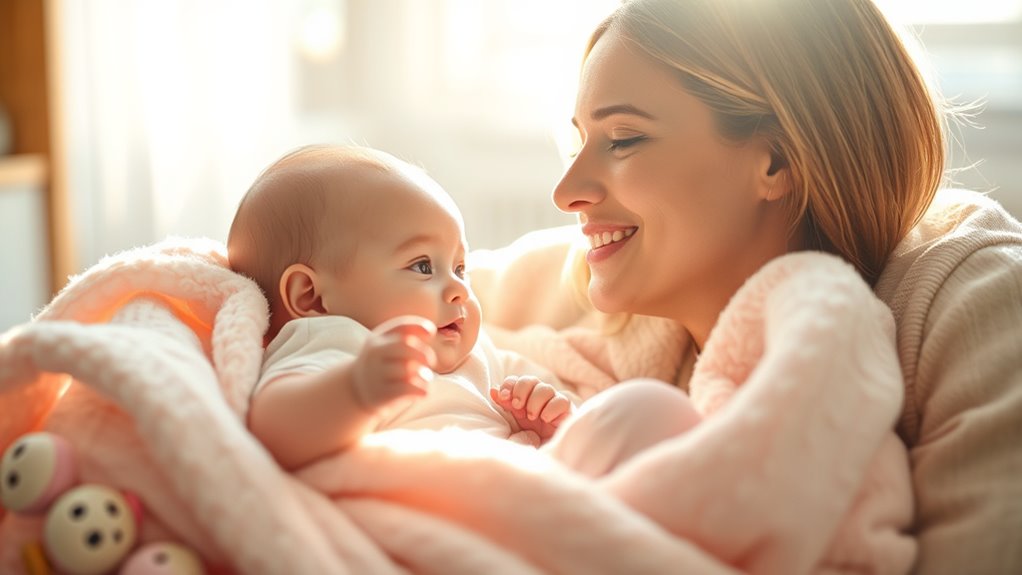
While your baby grows, social and emotional development plays an essential role in forming connections with others. Early interactions like cuddling and responding to needs help build strong bonds with you. This consistent nurturing fosters trust and security, allowing your baby to feel safe.
You’ll notice your little one starting to smile socially around two months, using these expressions to communicate. Engaging in playful interactions, like peek-a-boo, enhances relationships and encourages emotional understanding.
As your baby learns to recognize emotions, they begin to respond with empathy. Establishing consistent routines and providing a responsive environment will further support their emotional growth.
Cognitive Skills: Problem Solving and Exploration
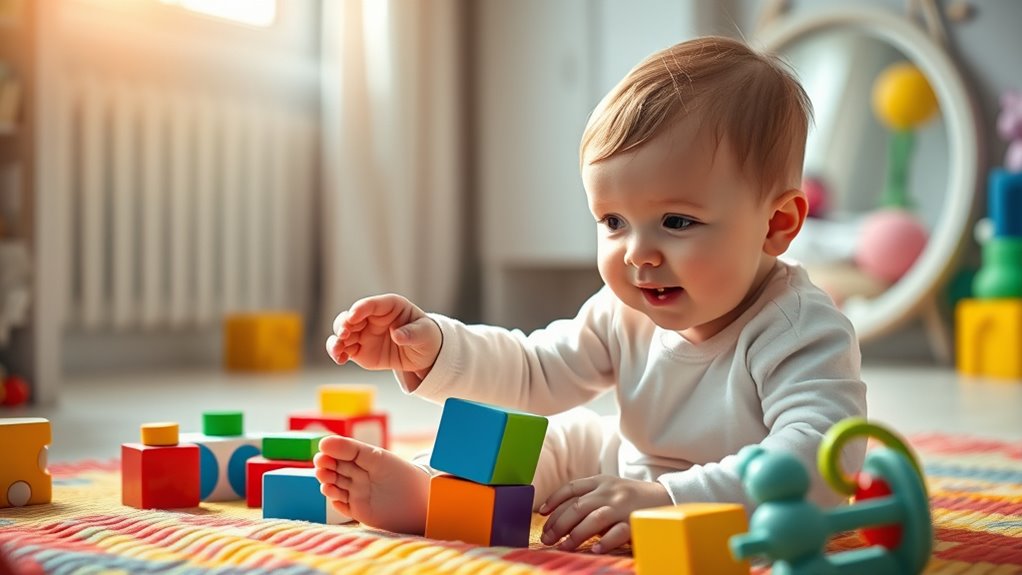
Cognitive skills develop rapidly during your baby’s first year, laying the groundwork for problem-solving and exploration.
In the early months, you’ll notice your newborn anticipating needs, like rooting for a nipple. By six months, your baby will begin to grasp object permanence and may reach for out-of-reach toys, showcasing their budding problem-solving abilities.
As they explore, they’ll respond to different tastes and focus on moving objects, including your face. From around four months, expect your little one to imitate your gestures and sounds, enhancing their learning.
Fine Motor Skills: From Grasping to Self-Feeding

Your baby’s journey of development continues with fine motor skills, which play an essential role in their ability to interact with the world.
In the first three months, you’ll notice their hands are usually clenched, but by three months, they start to grasp objects briefly.
Between four to six months, they’ll use a raking motion to pick things up.
As they reach six to nine months, they’ll develop the palmar grasp for more effective holding.
By nine to twelve months, watch for the emergence of the pincer grasp, allowing them to pick up small foods like Cheerios.
Gross Motor Skills: Crawling and Cruising
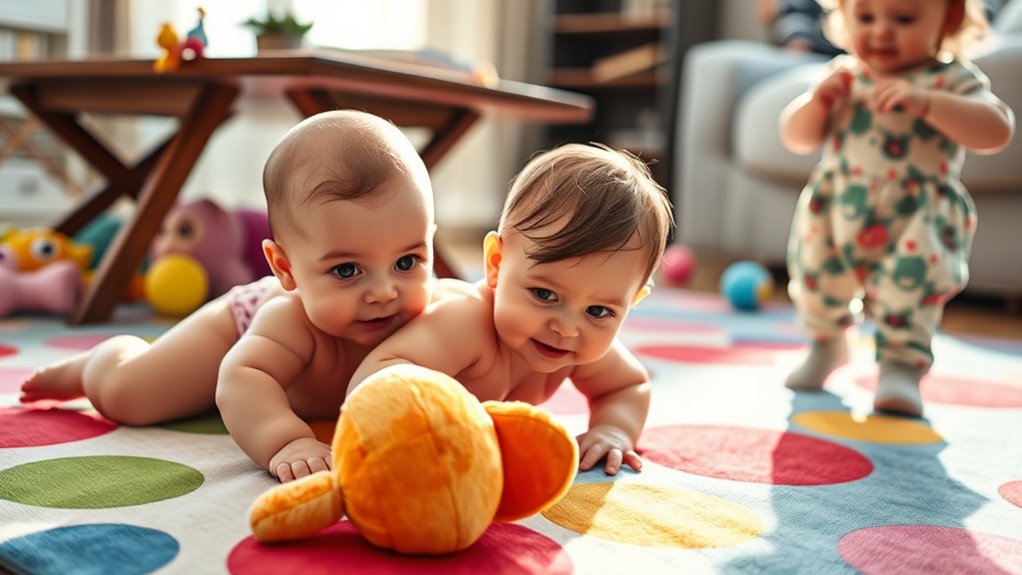
As babies grow and develop, gross motor skills become increasingly important, marking significant milestones in their first year.
Between 6 to 9 months, you’ll notice your baby sitting independently and assuming a hands-and-knees position, ready to crawl. They’ll start moving forward or backward, showing newfound freedom in exploration.
By 9 to 12 months, they’ll pull themselves up to stand while holding onto furniture and begin cruising sideways, gaining confidence with each step. Your little one may even take a few steps without support, inching closer to walking independently.
Encouraging these movements through safe spaces lets them practice and strengthen their skills, paving the way for more adventurous milestones.
Enjoy this exciting phase of growth!
Understanding Object Permanence and Familiarity
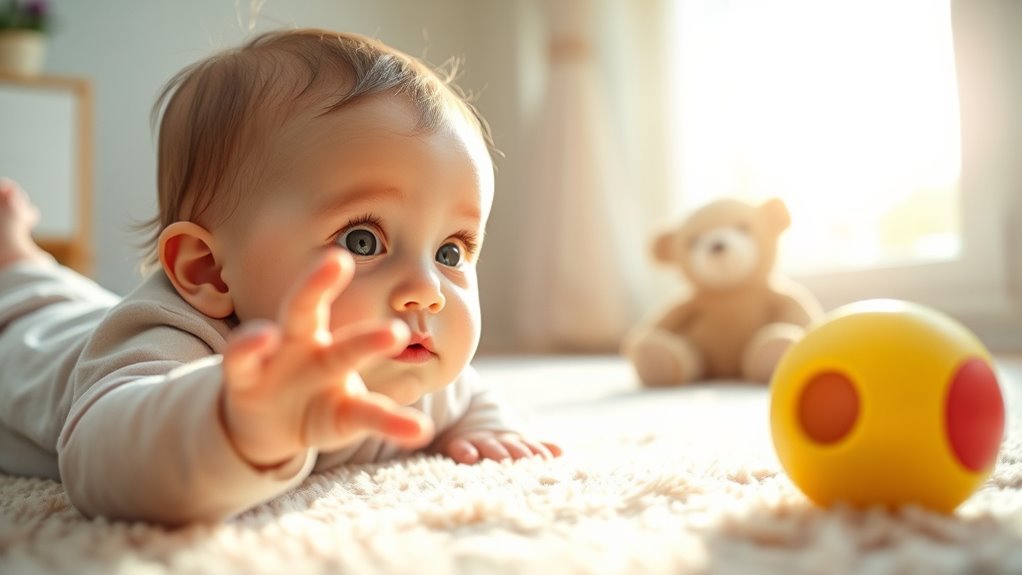
While your baby is mastering gross motor skills, they’re also developing important cognitive abilities, including understanding object permanence. This concept emerges between 4 to 8 months, allowing your little one to realize that objects continue to exist even when out of sight.
You might notice them searching for hidden toys or showing distress when you leave the room. This cognitive milestone is vital for memory, exploration, and even language acquisition.
As they grow, your baby will shift from preferring familiar objects to showing interest in new ones, indicating stronger object representations. Supporting this development through games like peekaboo can enhance their understanding, making playtime both fun and educational.
Engaging in Play: Enhancing Learning and Bonding
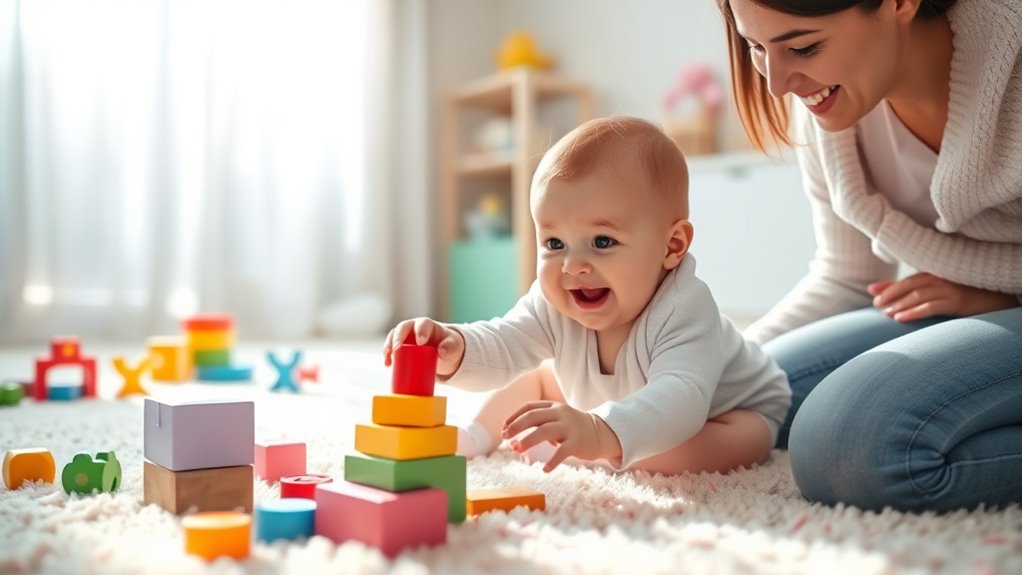
Engaging in play is essential for your baby’s development, as it not only enhances learning but also strengthens the bond between you and your little one.
Through play, your baby develops sensory and motor skills, exploring the world with touch, sound, and sight. During these interactions, you both share precious moments that deepen your connection.
Through playful exploration, your baby hones sensory and motor skills while you share cherished moments that strengthen your bond.
As your child grows, they’ll start to understand cause and effect by repeating actions, like dumping and filling. Play also fosters social skills, encouraging your child to engage with others.
By actively participating in your baby’s play, you create a stimulating environment that promotes cognitive and emotional development.
Frequently Asked Questions
What Should I Do if My Baby Isn’T Meeting Milestones?
If your baby isn’t meeting milestones, don’t panic; it’s important to take action.
Start by tracking their progress with a milestone checklist. Document any concerns and prepare questions for your next pediatrician visit.
Discuss your observations with the doctor, and don’t hesitate to seek referrals to specialists if needed.
Early intervention can make a significant difference, so stay engaged and support your baby’s development through nurturing and interactive play.
How Can I Encourage My Baby’S Development at Home?
You might think encouraging your baby’s development is complicated, but it’s simpler than you think.
Engage with your baby during playtime, using toys that promote reaching and grasping. Talk to them often, narrating your actions to support language skills.
Provide safe spaces for them to explore movement, and don’t forget to celebrate their achievements, no matter how small.
These interactions foster their physical, social, and cognitive growth in a nurturing environment.
Are There Signs of Developmental Delays to Watch For?
You should watch for signs of developmental delays, like your baby not rolling over, sitting up, or crawling by typical ages.
If they struggle to bear weight on their legs or don’t reach for toys, that’s concerning.
For language, listen for a lack of babbling or gestures by certain milestones.
Socially, if they don’t respond to their name or engage with you, it might indicate a delay.
Monitoring these signs can help you seek support early.
When Should I Consult a Pediatrician About Milestones?
Imagine planting a seed and enthusiastically watching it sprout.
Just like that seed, your baby’s growth has its own timeline. If you notice delays—like not rolling over by six months or missing first words by twelve months—it’s time to consult a pediatrician.
Trust your instincts; if something feels off, don’t hesitate to ask for guidance. Regular check-ups help guarantee your little one’s development stays on track and thriving.
How Do Temperament and Personality Affect Milestone Progression?
Temperament and personality play a significant role in how your child progresses through milestones. For instance, children with an easy temperament often adapt quickly, reaching social and emotional milestones smoothly.
Meanwhile, those with a difficult temperament may struggle due to heightened emotional reactions. Understanding your child’s unique personality helps you tailor interactions and activities, supporting their development.
Conclusion
As your little one sets out on this remarkable journey, think of them as a tiny explorer charting uncharted waters. Each milestone they reach is like discovering a new island filled with treasures—rolling, babbling, and eventually walking. Your support is the sturdy ship that helps them navigate these exciting adventures. Embrace each moment, for these early experiences are the winds in their sails, guiding them toward a future brimming with possibilities and joy.
